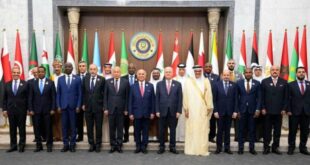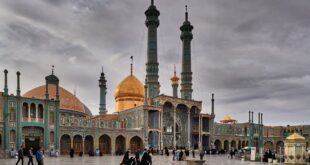New Iranian President Ebrahim Raisi named Hossein Amir-Abdollahian as the nation’s next foreign minister on Wednesday, succeeding Javad Zarif.
Mr Amir-Abdollahian served as Iran’s deputy foreign minister for Arab and African affairs under conservative president Mahmoud Ahmadinejad and moderate Hassan Rouhani.
He was appointed deputy foreign minister in 2011 under Mr Ahmadinejad, but left the foreign ministry in 2016, moving on to become the adviser for international affairs to former parliament speaker Ali Larijani.
In his role as deputy foreign minister for Arab and African affairs, Mr Amir-Abdollahian was in charge of Tehran’s policies in some of the most strategically important countries to Iran, including Iraq, Syria, Lebanon, Bahrain and Yemen.
He was the only area-specific deputy foreign minister who stayed on after Mr Zarif was appointed foreign minister. He is said to have very close ties with Iran’s Islamic Revolutionary Guard Corps and was largely kept on in the reformist government of Mr Rouhani at the behest of Qassem Suleimani.
Mr Amir-Abdollahian has a doctorate in international relations from Tehran University and is said to be fluent in Arabic and English, although he speaks to the media only in Farsi.
He has been a mainstay of Iran’s hardline political scene for quite some time but came to global prominence in 2007 when he was part of a small team of Iranian negotiators who met American counterparts to discuss the security situation in Iraq – the first meetings between US officials and Iranians since the revolution. He was also named as Iran’s ambassador to Bahrain in 2007.
Mr Amir-Abdollahian is taking on a complicated role at a pivotal time. His predecessor, Mr Zarif, had become a public face for Iran on the global stage. His ties to the West, his role in the nuclear negotiations and his diplomatic ability and his jovial demeanour provided an opening between Iran and western countries.
Mr Amir-Abdollahian is unlikely to take on a similar role.
Negar Mortazavi, journalist and host of The Iran Podcast, said there was no other diplomat, moderate or hardliner, who had Mr Zarif’s “unique abilities”.
“Javad Zarif has been the most competent diplomat that the Islamic Republic has ever produced in its history … a unique figure, in that he had the trust of the core of the system,” she said.
“He was educated in the US, he speaks the language and he understands the culture. He knows how to talk to the Americans, to the international community, to the media, he was sort of a negotiator, a top diplomat and a spokesperson all at the same time.”
Mr Raisi’s past is expected to make Iran’s foreign minister the country’s global face once again.
Mr Raisi’s election has caused outrage among human rights activists and political leaders around the world. His role in the death committees of the 1980s and his harsh sentencing as Iran’s judiciary chief have come under significant scrutiny since the election.
Many people are waiting to see “whether the [foreign minister] can somehow fill the void that’s going to exist between governments speaking to each other”, said Adnan Tabatabai, Iran analyst and chief executive and co-founder of the Centre for Applied Research in Partnership with the Orient in Bonn, Germany.
Mr Raisi’s past is likely to be a continuing issue for foreign relations, Mr Tabatabai said.
It is too early to tell how Mr Amir-Abdollahian’s appointment will affect the nuclear negotiations, but Mr Raisi’s government has not only indicated it will take a harsher position, its hands are tied, Mr Tabatabai said.
Mr Rouhani has predicted that Mr Raisi and his team will be unlikely to reach a deal with the US owing to a law passed by the hardline and conservative majority parliament in December 2020.
The law forces the government to adopt a series of escalatory nuclear-related steps in the absence of the US’s involvement in the deal Iran signed in 2015 with global powers.
Even with the blessing of Iran’s supreme leader Ayatollah Ali Khamenei on the negotiations, Mr Raisi and his foreign minister will be forced to follow the letter of the law.
Mr Raisi’s Cabinet still has to be approved by Iran’s parliament at its next session on Saturday.
 Eurasia Press & News
Eurasia Press & News



